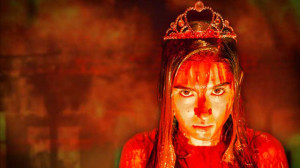There must be something in the air, and it’s something grotesque. Or maybe it’s just that it’s October. In any case, the same weekend that the San Francisco Opera closed its operatic version of Dolores Claiborne, Ray of Light Theatre opened a musical version of another Stephen King novel, Carrie.
This West Coast premiere at the Mission’s venerable Victoria Theatre is a long time coming. One of the most infamous and expensive flops in Broadway history, Carrie the Musical opened in May of 1988 and closed three days later. Its tryout run earlier that year in Stratford-upon-Avon, William Shakespeare’s home town, had been plagued with disasters such as stage blood shorting microphones and one of the stars being nearly beheaded by the scenery on opening night. The show was buried for decades thereafter, with only an occasional surreptitious student production popping up every now and then despite the soundtrack and rights being unavailable. But the show’s original creators, writer Lawrence D. Cohen (who also wrote the screenplay of the 1976 movie version and is weirdly credited as “Leonard Cohen” throughout Ray of Light’s program) and composers Michael Gore and Dean Pitchford, finally reunited to completely revamp it for a 2012 off-Broadway revival, replacing a third of the songs outright.
A Stephen King musical doesn’t seem nearly as weird of an idea now as it might have in the 1980s, because stage musicals of cult movies and all manner of perverse topics are commonplace nowadays. After Bat Boy the Musical and Evil Dead the Musical, there’s something almost quaint about the simple story of a shy teenage oddball who’s picked on in high school and just wants to fit in.
In a different world, half of Stephen King’s protagonists would have been the X-Men: a telekinetic in Carrie, a pyrokinetic in Firestarter, telepaths in The Shining and Dreamcatcher, a precognitive in The Dead Zone, a healer in The Green Mile, and so on. They’re lonely, often terrified people who don’t understand what’s happening to them, and terrible things usually happen as a result. If only there were a benevolent advocate for mutant rights seeking them out, banding them together and showing them how to use their powers for the common good. But alas, that sort of thing just doesn’t happen in the real world, and is ultimately more far-fetched than the powers themselves. In life as in horror fiction, waiting around for someone to come fix your life isn’t a very good plan.
Setting unearthly horror in some recognizable approximation of the day-to-day world of just plain folks is what King is known for, but the story of Carrie White is especially relatable. She’s an introverted misfit who’s teased mercilessly by her fellow students, and who doesn’t know that experience, from one side or another? But of course not everyone was raised by a mother who’s a borderline psychotic religious fanatic, nor do they have the power to move objects with their mind. Pushing someone like that too far is probably a very bad idea.



